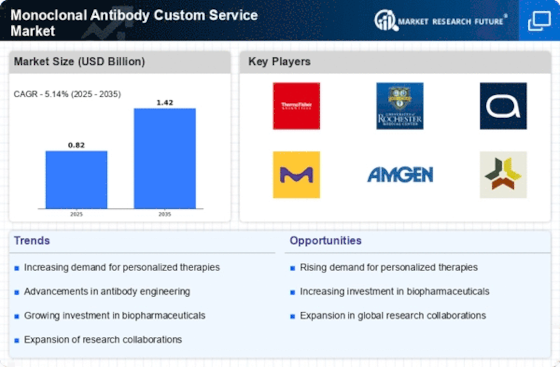Market Share
Monoclonal Antibody Custom Service Market Share Analysis
The Monoclonal Antibody Custom Service market is a dynamic sector driven by the increasing demand for personalized therapeutic solutions. Companies in this field employ various market share positioning strategies to stay competitive and cater to the diverse needs of the healthcare industry. Established players in the Monoclonal Antibody Custom Service market concentrate on specialized therapeutic sectors or techniques, thereby becoming specialists in those fields. This niche opens in opportunity to them to provide customized solutions and slant an edge over more general service providers. Strategic partnerships with pharmaceutical companies, research organizations as well as biotechnology companies are essential for positioning the market. Through partnerships then Monoclonal Antibody Custom Service providers get new markets, resources are shared, and logics of combined expertise to develop new smart target. Variability in customer needs has forced companies to embrace flexible service models to get a larger market share base. This flexibility is exhibited by the fact that services offered include antibody discovery and development, production and purifications, thus enabling clients to opt for tailor made packages chosen primarily to match their needs. Market leaders have to keep their relevance by staying on the edge of technology. Uninterrupted investment in research and development guarantees the latest technologies on dedicated systems to ensure efficient output, providing Monoclonal Antibody Custom Service providers the opportunity to provide advanced solutions that meet their clients’ needs. Market positioning means to broaden the area of services. It is possible to achieve significant benefits by setting up a worldwide presence through distribution networks or strategic alliances with international partners which in its own respect enhances accessibility, thereby making it possible for the monoclonal antibody custom service providers to reach out to clients globally. Quality assurance and conformity to set standards facilitate the establishment of trust between market players. Clients are assured of the working of their custom monoclonal antibody services because companies have put in place strong control processes, and the regulatory guidelines are observed. Developing positive relationships with clients is their competitive strategy. This includes providing clientele with quality support from start to completion; involving clients at every part of the service process; responding to and distracting for feedback to ensure quality levels remain high. Such factors of client retention should include the availability of competitive and transparent pricing structure. Pricing structure of providers of Monoclonal Antibody Custom Service delineates the model that soughts between the affordable services and the quality of those along with the specificity, thus, the providers are always able to consider them as attractive in competitive markets. Strategic marketing contributes greatly to market positioning. Monoclonal Antibody Custom Service providers look at targeted marketing campaigns, trade show presence with some participation as well as publishing research findings forms them to build a brand image that differentiates them from competence. The market leaders constantly broaden their service portfolio to capture up on rising tastes and varying consumer requirements. This might include broadening product families into nontraditional therapeutic areas, bringing novel technologies, or adding other services such as antibody engineering and optimization.
A skilled workforce is a cornerstone of success in the Monoclonal Antibody Custom Service market. Companies invest in talent acquisition and ongoing training programs to ensure their teams possess the expertise required to deliver high-quality, customized solutions.







Leave a Comment